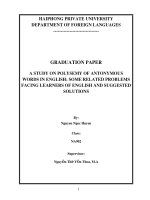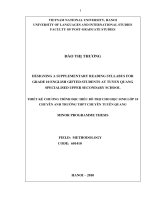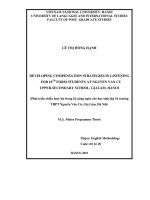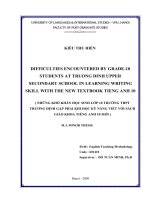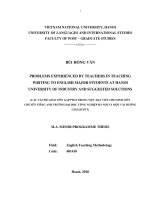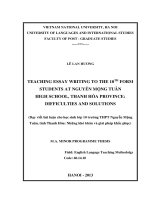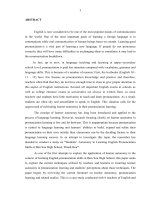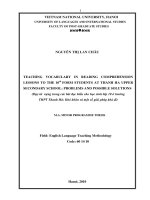Typical essay writing problems facing upper secondary students and possible solutions
Bạn đang xem bản rút gọn của tài liệu. Xem và tải ngay bản đầy đủ của tài liệu tại đây (131.76 KB, 18 trang )
Teaching Experience Initiative
School-year: 2018-2019
“Typical Essay Writing Problems Facing Upper-secondary Students
and Possible Solutions”
__________________________________
PART I: INTRODUCTION
I. Rationale for selecting the topic of the study:
In the recent years, English teaching and learning practice has shifted its focus
to listening and speaking skills, due to the increased demand of using
communicative skills on the global scale. Additionally, most English tests are in the
form of multiple-choice questions, including the English test that upper-secondary
students nationwide have to take at the National Examination of Secondary
Education. Thus, the majority of high school students almost pay every attention to
listening and speaking lessons, and then to techniques to do multiple-choice tests
effectively, instead of putting enough emphasis on mastering their writing skills,
especially essay writing skills.
Writing belongs to the process of language reproduction in which writing an
essay is, perhaps, the most challenging part to a large number of students. It would
not be an overstatement that essay writing has been a terrible nightmare for so many
students, even talented ones. The nightmare is so haunted that my students usually
get too nervous to accomplish their writing entirely. Some time, they even skip the
writing tasks they have been assigned, as a message that they surrender to this
obstacle. Meanwhile, no one can deny the importance of such a high-level
reproductive skill of language in written communications.
As a teacher of English, I always harbor a desire to help my students develop
their language skills in a comprehensive way, also to prepare them better for higher
stages of education and their future jobs. It is the desire that has constantly urged me
to do something practical to improve the situation. Hence, the topic “Typical Essay
Writing Problems Facing Upper-secondary Students and Possible Solutions”
has been chosen and studied in the hope of addressing difficulties in essay writing
student are having to confront as well as suggesting answers to these problems.
II. Purposes of the study:
This study aims to raise students’ awareness of the importance of English
essay writing in written communications. On that basis, they can have more
motivations and interests in studying how to write essays and doing practice more
regularly. As a result, they will gradually be able to master their performance in
essay writing. Furthermore, with this experience initiative, I hope to contribute some
of my personal ideas on essay writing to teaching experience sources for my teacher
colleagues to use as a reference in the English teaching process in general.
Le Thi Lan Anh
Mai Anh Tuan High School
Page 1
Teaching Experience Initiative
School-year: 2018-2019
III. Objects of the study:
This teaching experience initiative specially focus on researching and
analyzing problems or difficulties that students encounter in English essay writing,
and finding out possible solutions to these problematic issues to help improve their
skill in producing essays.
IV. Scope of the study:
The study process was mainly based on the English programme for the uppersecondary students at Mai Anh Tuan High School in the school year 2018-2019, and
through English tests and examinations for high school students in the recent years.
V. Bases and of the study:
The experience initiative has been studied based on my own practical
teaching experiences, referring to documents related to the researched topic,
including database from the internet, observing other teachers’ lessons, and
consulting my colleagues, who are experienced in teaching English at high school.
PART II: DEVELOPMENT
I. Problems facing students in English Essay writing:
As learners of English as a foreign language, students have to face to a wide
range of difficulties in writing English essays, an academically challenging task.
The problems may be caused by the outer or intra-lingual factors of English. These
factors, whether internal or external, can make the task of mastery difficult for
learners of English to achieve, and can have a negative effect on their proficiency.
Following are the common challenges that may face students in writing and restrict
their achievement.
1. Over-obsession named essay writing:
Nowadays, most students are too obsessive with writing essays whether in
their mother tongue or in a second language such as English. They tend to think that
this task is beyond their ability, and that it is only a waste of time because they can
never write a good essay; hence, they choose to quit the task right from the
beginning despite its importance.
2. Effects of modern lifestyle:
Schoolchildren are living a fast-paced life in which everything seems to run at
the speed of light. With the support of modern devices, spoken communications
become easier and more convenient than ever before. Rather, the tendency of
teaching and learning English at present is to focus more on spoken communication
Le Thi Lan Anh
Mai Anh Tuan High School
Page 2
Teaching Experience Initiative
School-year: 2018-2019
skills than on written ones. In consequence, writing skills, including essay writing,
attract little attention from high school students.
3. Lack of motivation:
At upper-secondary level of education, one of the primary motivations to
master writing skills seems to be examinations. However, apart from the gifted
student examinations, there are hardly other ones to motivate students. Also, a flash
of anxiety about future careers appears not to be great inspiration to urge students to
pay much attention to essay writing.
4. Lack of ideas:
A number of students read their essay writing questions and find no ideas to
develop in their writings. They also get stuck right from the opening part of their
essays.
5. Lack of vocabulary:
Students hardly enjoy essay writing when they have an insufficient stock of
vocabulary. The outcome of their vocabulary insufficiency is nothing but poor
quality essays.
6. Thinking in the mother tongue:
Students are greatly influenced by their first language. They tend to do their
thinking in the mother tongue, and then try to translate what they have thought into
English. Their habit usually makes their writing products become a mess!
7. Poor Grammar and Syntax Skills:
Even the most talented students need to learn how to understand complex
sentences, differentiate different parts of speech, use proper punctuation and
proofread their writing for errors.
8. Lack of evidence and relevance:
Students sometimes provide evidence that is not relevant to the main topic.
This is a consequence of not spending enough time for planning the essay or trying
to reach the word limit. It may also be the case that even relevant facts can appear
irrelevant because students sometimes do not use appropriate wording and fail to
link different paragraphs and ideas with each other. As a result, even relevant facts
and arguments sound irrelevant.
9. Essay question misunderstanding and wrong identification of essay types:
Students sometimes fail to understand the questions, and get difficulty in
identifying the right essay type to write. Thus, their writing may easily digress in an
inappropriate format.
10. Weak or no thesis statements:
Students’ creative ability seems to be infinite, so that sometimes they keenly
pursuit and try to express their creative thoughts without realizing that they have
written a long paragraph or essay with a weak or no thesis statement.
Le Thi Lan Anh
Mai Anh Tuan High School
Page 3
Teaching Experience Initiative
School-year: 2018-2019
11. Lack of cohesion and coherence:
Sometimes students write such rambling essays that can be difficult for their
readers to understand. The information may be presented without being clearly
related to the given assignment question, and/or without conforming to the genre
pattern expected in the context. An incoherent essay, of course, can never get great
appreciation.
12. Failing to structure ideas effectively in a proper format:
Students may have numerous interesting and creative ideas; however, their
time for essay writing is limited, so they occasionally fail to find the best way to
structure their ideas in content effectively.
Sometimes, students’ essays does not follow any standard format. They write
down anything they can think out without considering whether it appears in the right
place or not. The sources used for their essay are not well organized and cited in a
way suitable for its type.
13. Poor time management:
Many students are not very good at time management, which leads to
inappropriate time division for different tasks and task incompletion. Undoubtedly,
when the task is not completed, their essay cannot be highly valued.
14. Plagiarism:
It can be seen as stealing someone else’s intellectual property when students
use their work without crediting. Gifted students have a good ability to remember
what they have read about a certain topic and then try to use as much as they can
when meeting the same topic. Once, one student remembered almost all the whole
essay of the same topic and wrote it down on her paper without forgetting a word
from the original.
15. Lack of writing practice:
Students, with their talent and intellectual ability, can deal with tasks, even the
most challenging ones, rapidly and effectively. Therefore, sometimes they seem to
be a little bit impatient with essay writing practice, a task that needs doing regularly
and seriously.
16. Getting little feedback on written essays:
Many teachers assign essay-writing tasks to students, but fail to provide them
with comprehensive feedback. Giving a student a grade for her/ his writing is simply
not enough if one wants to teach her/him how to write better.
II. Suggested problem solutions:
Generally, high school students today face numerous challenges in terms of
essay writing. In order to help them overcome these obstacles, there are possible
solutions as follows.
Le Thi Lan Anh
Mai Anh Tuan High School
Page 4
Teaching Experience Initiative
School-year: 2018-2019
1. Over-obsession named essay writing:
To help students steadily overcome their over-obsession named essay
writing,
it is better to find out their strengths, even the smallest ones, to give them positive
comments and timely praise them. For example, “Your word choice is really
creative/impressive!” “This is the best-organized essay you have!” “Your essay
captures my interest with some really great ideas!” “Your writing is beyond my
expectation!” or “Your handwriting looks so nice!” … To the best of my
knowledge, it is these fair comments and well-timed praise that can help the
students have more confidence in themselves as well as motivate them to bravely
face such difficult tasks as essay writing. Further, it is advisable to give the students
a very clear explanation of English essay writing importance, not only in their
exams but also in their future career and life, to them so that they can realize how
vital it is. Besides, they should be provided with essay writing tasks with the level of
difficulty gradually increasing in order to avoid their obsession with the tasks.
2. Effects of modern lifestyle:
To limit the effects of modern lifestyle on students’ essay writing, common
topics are often selected and the students are encouraged to share their ideas on
these topics by writing them down sometimes, choosing formal language to express
their opinions or outlooks. Each time students use spoken English or teenage slang
to convey something, I often ask them to think out some other ways to express their
points more formally. If they failed to do that, I would suggest some possible
solutions. Moreover, they are shown that it would be better when they could make
improvements in both spoken communication skills and written ones, especially, to
the ones who want to get a scholarship for studying abroad.
3. Lack of motivation:
Writing examinations are great motivations to students, so that essay-writing
contests have been suggested being organized to stimulate the spirit of studying
writing essays among my students. This kind of task has also been proposed being
included in the English exams at Mai Anh Tuan high school to create more chances
for our students to train themselves and improve essential skills for their future
career. Moreover, monthly competitions of essay writing organized for students in
the same class with interesting small prizes for the winners have motivated them
much in improving their writing skills.
4. Lack of ideas:
To have various creative ideas for essay writing, students should properly
develop their background knowledge as well as their analytical and cognitive skills.
There are some simple ways for them to do this as follow. The first would be active
reading, involving questioning what they are reading when they read. By asking
questions as they read, they are engaging their brain in higher thinking. Another
useful technique is to question and compare the writers’ perspectives on a subject to
Le Thi Lan Anh
Mai Anh Tuan High School
Page 5
Teaching Experience Initiative
School-year: 2018-2019
their own. They also should take note of new ideas and thoughts that are a result of
their reading. Active reading stimulates and expands their brains and allows it to
think in new ways.
Students are advised to join discussions or conversations, ask everyone they
meet questions, and try to learn something from them. Whether it is life lessons such
as how to manage stress or how they developed successful careers or what their
parenting philosophy is, questions are essential to keeping the brain engaged. They
can improve their interpersonal communication skills at the same time and maybe
even make a friend or two. By improving their analytical skills, they can be able to
comprehend and appreciate debates and concepts, break down complex information
and streamline solution-finding processes.
When students have ideas for their essay, they are advised to make an outline
for it. With an appropriate brief outline, it will not be too difficult to start writing.
5. Lack of vocabulary:
Students can enrich their vocabulary stock themselves by reading and
learning new words or phrases in contexts. They can also study more words from
their dictionaries. When they meet a new word, they should learn all other words in
its family and patterns as well as idioms related to it. Another better way to help
them build up their vocabulary is to try to have conversations or discussions about
topics where new words or phrases are inserted. They are also encouraged to follow
English programs or watch films in English on TV or the internet to widen their
vocabulary.
Besides, I have suggested my students form chatting groups using such modern
applications on their smartphones or computers as Zalo or Messenger to chat and
share new words or phrases they know about a certain topic after each of their
lessons in class.
6. Thinking in the mother tongue:
Thinking in the native language is a normal tendency to foreign language
learners. However, it is too difficult for students to get a great success when they
wish to express their ideas in English while doing their thinking in their own
language! Therefore, it is important that they stop thinking in their mother tongue
and trying to translate in their heads.
One good way to do it is to use monolingual dictionaries where the entries
and their definitions are written in the language they are learning. By using this kind
of dictionary, students can train their brain to focus on the meaning, or the concept
that a word represents, rather than its literal translation into their native language.
By that way, they are less likely to translate it themselves when they use it.
Another useful method is to use images instead of translations when learning
new vocabulary. Using images or symbols while writing new words down again and
again can help train their brain to stop translating words when communicating in
Le Thi Lan Anh
Mai Anh Tuan High School
Page 6
Teaching Experience Initiative
School-year: 2018-2019
English. That is because they can learn to associate words with images or symbols
rather than their exact translations.
Besides, students should read a lot and memorize phrases and structures.
When reading, they have to confront idiomatic expressions and phrases. This time,
they should try to memorize those phrases and structures that they come across –
this will help them when constructing their own sentences. Instead of having to
make them start from scratch when they need, students will be able to recall some of
the phrases and structures that they learned when reading. Also, because they have
the ready-made phrases and structures in their heads, they won’t have to look for
translations of individual words and their brains will be less likely to be preoccupied
with that.
One more way that is a bit funny to help students prevent themselves from
thinking in their native language and trying to translate into English is that they tell
themselves off! Whenever they catch themselves translating words in their heads,
they must say “translation, translation, translation.” By doing that, they can draw
their own attention to the frequency with which they translate in their heads.
Consequently, they begin to do it less frequently.
7. Poor grammar and syntax skills:
To notice the progress that my students makes in terms of grammar and
syntax, I always try to listen to them and point out to the mistakes they make. I also
ask them what they have learned every day and have conversations with them often.
While speaking to them, I carefully pay attention to the sentences they form.
Moreover, I often spend some certain time reading and marking their essays, then
taking notes of their errors of grammar and syntax and suggesting possible ways to
correct these errors. Additionally, I have established peer groups and encouraged
students to peer-review, which helps them make much progress in writing
compositions.
8. Lack of evidence and relevance:
With irrelevant evidence, students cannot support and prove their argument
effectively. Therefore, students should have relevant evidence in their essay in order
to persuade the readers and increase the validity of the argument. The best solution
is to study well and get acquainted with the topic. While reading about their topic,
they need to take notes on the most relevant issues and store them for later use (for
references and citations).
Additionally, to limit irrelevant evidence in their essay, before students start
writing an essay, they had better make an outline and plan their essay carefully.
They also try to connect each part of their essay, arguments and facts to the main
idea and the topic. At each stage of the essay, they need to keep asking themselves
“Is this relevant?”, “Am I answering the question?”, and “Does this relate directly to
the subject I have been asked to discuss?” If they begin to introduce a new and
separate problem or topic to discuss and prove a part of their argument, they have to
Le Thi Lan Anh
Mai Anh Tuan High School
Page 7
Teaching Experience Initiative
School-year: 2018-2019
make sure that they return to the main subject and explain how these secondary facts
are relevant to the main argument.
9. Essay question misunderstanding and wrong identification of essay types:
One of the reasons why students sometimes misunderstand the essay
questions and fail to identify the right type of essay is because they get too nervous
when reading these questions. Therefore, students should study the questions
carefully to know what to do. At the same time, they need to try their best to keep
calm and enhance their confidence while confronting with difficult questions in
important exams. And, the best way to be free from fear in this situation is to study
well and make good preparations for it.
Moreover, right identification of essay types is much dependent on the nature
of each type of essay. Hence, I discuss with the students the significant features of
different essay types, focusing on prominent signals right from the essay questions.
There are four main genres of essay writing, including Expository essays,
Descriptive essays, Narrative essays, and Argumentative (Persuasive) essays.
a. Expository Essay Definition:
An expository essay explains something or answers questions like: What is
it?/
How should we define it?/ How do you do it?/ How does it work?/ What is the
history of it?/ What caused it? What are the effects?/ What is the meaning of it? [1]
b. Descriptive Essay Definition:
A descriptive essay, as the name implies, is a form of essay that describes
something. In this genre, students are assigned the task of describing objects, things,
places, experiences, persons, and situations. The students use sensory information to
enable readers to use their five senses of touch, taste, smell, hearing, and sight to
understand the topic of the essay. [1]
c. Narrative Essay Definition:
A narrative essay is a type of essay that tells a vivid story, usually from one
person’s viewpoint. It uses all the story elements - a beginning, middle and ending,
plot, characters, setting and climax – all coming together to complete the story. [1]
d. Argumentative (Persuasive) Essay Definition:
An argumentative essay is a type of essay that presents arguments about both
sides of an issue. It could be that both sides are presented equally balanced, or it
could be that one side is presented more forcefully than the other. It all depends on
the writer, and what side he supports the most. [1] To recognize this type, the
students need to pay attention to such words or phrases in the questions as:
Give the arguments for and against.../ Assess the importance of.../ Examine the
arguments for and against.../ What are the advantages and disadvantages of...?/
Evaluate.../ Critically examine the statement that.../ To what extent is...true?/
Le Thi Lan Anh
Mai Anh Tuan High School
Page 8
Teaching Experience Initiative
School-year: 2018-2019
Discuss.../ Give your views on.../ What do you think about...?/ Do you agree that...?/
Consider whether.../ To what extent.../ How true.../ How far do you agree... [1]
10. Weak or no thesis statements:
Every paper students write should have a main point, a main idea, or central
message. The argument(s) they make in their paper should reflect this main idea.
The sentence that captures their position on this main idea is what we call a thesis
statement.
A thesis statement focuses their ideas into one or two sentences. It should
present the topic of their paper and make a comment about their position in relation
to the topic. Their thesis statement should tell their readers what the paper is about
and help guide their writing and keep their argument focused.
Students should provide a thesis early in their essay - in the introduction, or in
longer essays in the second paragraph - in order to establish their position and give
their readers a sense of direction.
In order to write a successful thesis statement, they should do the following:
- Avoid burying a great thesis statement in the middle of a paragraph or late in
the paper.
- Be as clear and as specific as possible, and avoid vague words.
- Indicate the point of their paper but avoid sentence structures like, “The
point of my paper is…” [1]
11. Lack of cohesion and coherence:
11.1 Cohesion:
Cohesion is basically the interconnection of two different sentences. How
these sentences are related to each other that is called cohesion.
To make their essay cohesive, students should do the following:
1. Use connectors/linkers
Candidates forget to put a simple linker that may be necessary. When they are
writing, they simply know their thoughts but when the examiner reads, he is not
aware of their idea. He will find it difficult to follow their ideas without linkers.
Linkers like for example, in addition to this, from my point of view, as far as
I know, etc. are some of the cohesive devices used in writing.
2. Use pronouns
Students can definitely use pronouns to avoid repetition of abstract nouns.
Repeating a name would seem awkward and therefore may fetch lower bands. For
this, they can use pronouns like this, that, it, they, etc.
3. Use synonyms
To avoid repetition, a candidate can definitely use synonyms or different
grammatical structures with various forms of a word. For example, a verb can be
converted into an adjective or a noun and so on.
Le Thi Lan Anh
Mai Anh Tuan High School
Page 9
Teaching Experience Initiative
School-year: 2018-2019
So, this is how their essay writing task coherence and cohesion is marked.
The students need to know all these to focus on their weakness. So, prepare well and
get their required results. [1]
11.2. Coherence:
Coherence is the logical arrangement of the writer’s ideas. All ideas should be
logically arranged and one key point should inevitably follow its explanation. That
is what makes a good paragraph.
Usually, students tend to write too many ideas in a single paragraph and that
often results in an incoherent paragraph. Those ideas are not fully developed.
Basically, students need to include vital information in every paragraph. First,
they need to have a clear idea of their essay structure. How many paragraphs they
are going to write and how these paragraphs will link with each other.
a. Introduction
b. Arguments in favour of your opinion
c. Arguments against your opinion
d. Conclusion
The above structure is just an example. The students can have their own
structure for the paragraph. Later on, they can build their paragraph level coherence
with the following points.
1. Make the topic sentence clear and concise: Very often, the first sentence
of the paragraph clearly states what is mentioned in the whole paragraph. This
sentence is called a topic sentence. This sentence needs to be simple and short. If
students’ topic sentence is too long, it means that they are trying to add too much
information into their paragraph. So, they need to edit and again assess it.
2. Don’t use too many points in a paragraph: Include only one or at most
two information in a paragraph. This arrangement allows students to develop their
topic fully and thus, they can represent their point of view more clearly.
3. Include examples: Examples are very informative and they clearly relate to
the topic. This makes reader understand the theme quite easily. So, use examples to
explain your point clearly.
4. Summarise the whole paragraph: Students should not forget to summarise
their paragraph with a short sentence or a result. Further, they should never leave
their paragraph in an awkward position.
5. Use punctuations precisely: Students often underestimate the importance
of punctuation marks. Nevertheless, they are as important as grammar. They make
every sentence clear. Without proper punctuation marks, the examiner will find it
extremely difficult to follow your line of thoughts. [1]
12. Failing to structure ideas effectively in a proper format:
To structure ideas effectively, students are advised to make an essay outline.
Le Thi Lan Anh
Mai Anh Tuan High School
Page 10
Teaching Experience Initiative
School-year: 2018-2019
1. Begin the outline by writing the topic at the top of the page.
2. Write the Roman numerals I, II, and III, spread apart down the left side of the
page.
3. Next to each Roman numeral, write the main ideas that they have about the topic,
or the main points that they want to make.
4. Write the best arguments, if trying to persuade.
5. Write the steps that should be followed, if trying to explain a process,
6. Group these steps into categories.
7. If having trouble grouping the steps into categories, try using Beginning, Middle,
and End.
8. If trying to inform, write the major categories into which the information can be
divided.
9. Under each Roman numeral, write A, B, and C down the left side of the page.
10. Next to each letter, write the facts or information that supports that main idea.
When they have finished, they have the basic structure for their essay and are
ready to continue. [1]
To be highly evaluated, an essay should be properly formatted. All sources
used must have good organization and be cited in a way suitable for the type of
paper. The important point here is to make sure that the students have this clear and
format all papers in the way requested.
Below is an example of suggested essay format of the argumentative type:
a. Introduction
Basically, it consists of two components:
+ The opening statement
+ The thesis/the idea of the essay
The introduction is aimed to get the full attention of the reader. The opening
statement needs to be clear and logical as it is the thought, which leads the reader to
the thesis where the persuasive essay idea is thoroughly presented.
b. Body paragraphs
The body of any persuasive essay reveals the arguments that support the
thesis statement of the work. Each of the arguments should include:
+ the point of argument
+ the explanation of the argument
+ facts/evidence that support the idea/thesis
+ a small summary leading to the next argument
c. Conclusion
Le Thi Lan Anh
Mai Anh Tuan High School
Page 11
Teaching Experience Initiative
School-year: 2018-2019
Summarize the persuasive essay idea. It is the evaluation of the statements
made and the arguments given. The conclusion therefore refers to the thesis
statement of the work. [7]
13. Poor time management:
Time management is one of the most important things that a student needs to
take care of when doing essay-writing practice, as well as during examinations.
Here are some golden rules of time management that help students to finish their
exam paper within the given time.
1. Keep the watch on the desk in front of them by the answer sheet. This helps
them to keep an eye on time while answering the questions.
2. If in the examination room, fill in the first page of the answer sheet that
contains their name, roll number and other necessary information before the exam
time officially starts to save time for their essay writing. When getting the question
paper, go through all the questions and start with the ones for which they are very
well prepared. Students should remember not to spend extra time on the ones they
are not sure of the answers because they may have little time left for the last part of
the test-normally an essay writing task.
3. Students should always divide the paper in parts and allocate enough time
for each question/part. Suppose they have to answer five questions in all and the
time on hand is only three hours, the better approach is to allocate 30 minutes to
each question and the remaining 30 minutes should be utilized for the revision, final
touch-ups, and tying up the answer sheets. Objective questions take less time than
others therefore allocation of time for these questions should be accordingly.
4. Students always have to remember they do not need to copy the questions
on the answer sheet. It is the waste of time.
5. It would be a better approach to put another tick on the answered question.
This will boost students’ energy and give them a sense of accomplishment.
6. Students should read the answers carefully once they have done the entire
paper. Many students read the answers just after writing them. It is a human
physiology that people may not see their mistakes immediately but reading the same
piece of writing after sometime can help them to identify easily and to overcome
errors.
7. Students should avoid taking breaks during the exam time, and not leave
early. Instead of leaving early, students should sit and re-read what they have
written; they can double-check all of their answers; check their spelling and rewrite
any illegible, hastily scrawled words.
14. Plagiarism:
To avoid plagiarism while writing an essay, students should know how to:
1. Paraphrase: A paraphrase is a restatement in students’ own words of
someone else’s ideas. They must change both the words and the sentence structure
Le Thi Lan Anh
Mai Anh Tuan High School
Page 12
Teaching Experience Initiative
School-year: 2018-2019
of the original, without changing the content. So, when they have found information
that is perfect for their essay paper, they can read it and put it into their own words.
2. Cite: Citing is one of the effective ways to avoid plagiarism. This usually
entails the addition of the author(s) and the date of the publication or similar
information.
3. Quote: When quoting a source, students should use the quote exactly the
way it appears.
4. Cite Quotes: Citing a quote can be different from citing paraphrased
material. This practice usually involves the addition of a page number, or a
paragraph number in the case of web content.
5. Cite students’ Own Material: - If some of the students’ material is being
used for their own essay, they must cite themselves. They should treat the text the
same as they would if someone else wrote it. It may sound odd, but using material
they have used before is called self-plagiarism, and it is not acceptable.
6. Reference: One of the most important ways to avoid plagiarism is
including a reference page or page of works cited at the end of their essay paper.
Instead of copying others’ ideas or even the whole essays of the same topic
that students have ever read and can remember; students should focus on
accumulating structures and topic-based vocabulary in appropriate contexts for later
use in their essays.
15. Lack of writing practice:
In order to become better in essay writing, students, even gifted ones, have to
practice it regularly and seriously. Without sufficient practice, students can never
take their writing skills to a higher level. Hence, after each unit students have learnt
in class, a number of follow-up topics are provided for students’ further practice. For
example, after unit 6 – Grade 12 English textbook, students are given such
assignments as “write an essay of about 150-200 words about a job you would like
to do in the future”, or “what do you think will be the most popular job in the
future? Write an essay to express your own opinion about this”…
In addition, I frequently show much care about the students’ practice, offering
them to ask for help if they need when they get trouble with their writing
assignments. Hard-working students should be praised in front of the whole class,
since such good mirrors are deeply influential in promoting the learning and
practising spirit among the students.
16. Getting little feedback on written essays:
Feedback is information that the teacher gives to the students that helps them
close the gap between where they are now with their work, and where they could be.
The goal of feedback is to provide students with insight that helps them to improve
their performance. Here are two steps that I have followed to give them effective
feedback:
Le Thi Lan Anh
Mai Anh Tuan High School
Page 13
Teaching Experience Initiative
School-year: 2018-2019
- Tell the students about their current level of performance.
- Tell them what they could do to improve.
After assigning essay-writing tasks to students, I always try to provide them
with comprehensive feedback, which affirms what they did well, corrects and
directs them, points out the process, and coaches students to critique their own
efforts, not only to give them a grade for their writing.
For students, to get more feedback on their essays, they should actively hand
in their products for the teacher to mark and give feedback on as soon as they have
finished writing.
For shy or less confident students, I myself actively offer to help them with
their assignments, and tell them to ask for help any time they need.
III. Further Practice:
No one can deny that Practice makes perfect. The acquisition of the theory is
undeniably important, however, practice is really a key to the mastery of students’
performance in essay writing.
To encourage students to do regular practice with much enthusiasm, a variety
of essay writing questions have been well prepared for students’ further practice in
class as well as after class. Below are some typical topics for students to practise:
1. Some experts believe that it is better for children to begin learning a foreign
language at primary school rather than secondary school. Do the advantages of this
outweigh the disadvantages? Give reasons for your answer and include any
relevant examples from your own knowledge or experience.[2]
2. Sports programmes are hugely popular on television nowadays. But some people
argue that these programmes are to blame for the poor health of many young people
who prefer to watch rather than part take in physical activity. To what extent do you
agree or disagree? [3]
3. As computers are being used more and more in education, there will soon be no
role for the teacher in the classroom. To what extent do you agree or disagree? [6]
4. In some countries, young people are encouraged to work or travel for a year
between finishing high school and starting university studies.
Discuss the advantages and disadvantages for young people who decide to do this.
Give reasons for your answer and include any relevant examples from your own
knowledge or experience. [2]
5. You have decided to give several hours of your time each month to improve the
community where you live. What is one thing you will do to improve your
community? Why? Use specific reasons and details to explain your choice. [6]
6. Nowadays, we are producing more and more rubbish. Why do you think this is
happening? What can governments do to help reduce the amount of rubbish
Le Thi Lan Anh
Mai Anh Tuan High School
Page 14
Teaching Experience Initiative
School-year: 2018-2019
produced? Give reasons for your answer and include any relevant examples from
your own knowledge or experience. [4]
…
After their practice, I usually select some samples, as well as ask my students
find some themselves, and then we study and analyze these sample carefully
altogether to find out the best ways to write excellent essay on a certain topic.
In addition, in my teaching process, I have always studied and updated the
new trends of essay questions and the marking criteria for my students to focus on to
help them take more interest in doing essay writing practice and achieve more
encouraging results, which contributes to their progress in their writing skills in
general.
PART III: CONCLUSION
I. Study results:
In my English teaching process, I have gradually provided my students a
system of knowledge related to writing an essay in English and useful suggestions
for practice that step by step help them get familiar with and consolidate their
theoretical knowledge as well as improve their practical skills. Various goals have
been set up for different students based on their own levels of English. After
applying the previously mentioned solutions to English teaching for some time, it is
quite encouraging that most of the students have had a more thorough grasp of basic
knowledge and certain skills to solve problems related to essay writing. However, it
is quite difficult for weak students to understand and to apply these skills in practice
because to practise well with these skills, the students must have a wide range of
knowledge covering various contents in English. Thus, through my lessons, I
constantly help the students revise and consolidate the knowledge that they have
learnt and improve their practical skills.
Below are some achieved results of the study after applied to English teaching
and learning in classes 12G and 12M at Mai Anh Tuan High School in the school
year 2018-2019. These statistics are based on the data collected from the answers to
the questionnaires my students gave and the written tests of essay writing at
different levels of difficulty at different points in time during this school year.
1. Before applying the initiative:
Problem
s
1
2
Students frequently facing essay writing problems
Class 12G (41 students)
Class 12M (42 students)
No. of students
%
No. of students
%
41
100
42
100
41
100
42
100
Le Thi Lan Anh
Mai Anh Tuan High School
Page 15
Teaching Experience Initiative
3
35
4
41
5
41
6
41
7
41
8
41
9
35
10
41
11
41
12
36
13
38
14
37
15
35
16
30
85.36
100
100
100
100
100
85.36
100
100
87.80
92.68
90.24
85.36
73.17
38
42
42
42
42
42
37
42
42
38
39
39
37
32
School-year: 2018-2019
90.48
100
100
100
100
100
88.10
100
100
90.48
92.86
92.86
88.10
76.20
2. After applying the initiative for a semester:
Problems
(numbered
)
1
2
3
4
5
6
7
8
9
10
11
12
13
14
15
16
Students frequently facing essay writing problems
Class 12G (41 students)
Class 12M (42 students)
No. of students
%
No. of students
%
30
33
25
35
32
31
30
31
26
35
32
28
23
23
25
24
73.17
80.49
60.98
85.37
78.05
75.61
73.17
75.61
63.41
85.37
78.05
68.29
56.10
56.10
60.98
58.54
32
34
28
37
33
35
32
34
27
37
35
30
24
25
30
27
76.19
80.95
68.29
88.10
78.57
83.33
76.19
80.95
64.26
88.10
83.33
71.43
57.14
59.52
71.43
64.26
3. After applying the initiative for the whole school year:
Problem
s
Students frequently facing essay writing problems
Class 12G (41 students)
Class 12M (42 students)
No. of students
%
No. of students
%
Le Thi Lan Anh
Mai Anh Tuan High School
Page 16
Teaching Experience Initiative
1
16
2
17
3
15
4
18
5
19
6
20
7
16
8
21
9
13
10
17
11
16
12
20
13
11
14
14
15
12
16
15
39.02
41.46
36.59
43.90
46.34
48.78
39.02
51.22
37.71
41.46
39.02
48.78
26.83
34.15
29.27
36.59
20
21
19
20
21
21
19
22
16
20
18
23
14
16
15
17
School-year: 2018-2019
47.62
50
45.24
47.62
50
50
45.24
52.38
38.10
47.62
42.86
54.76
33.33
38.10
35.71
40.48
The above estimated figures are not very impressive; however, they indicate
that the initiative has initially produced encouraging results. The students’ essay
writing skills have been advancing considerably with steadily decreasing numbers
of students who face essay-writing problems. There will be much to do next time to
see more improvement in the study; hence, I would like to share this teaching
experience initiative in the hope that it could help contribute a little to improving the
quality of teaching English at the upper secondary education. Moreover, I do wish
that the study would be of some value to both teachers and students in their process
of English teaching and learning essay-writing skills.
II. Suggestions:
Obviously, the study still has certain limitations. Thus, it would be my
pleasure to get as many pieces of contributive advice or suggestions as possible to
better my teaching initiative so that it will become more productive in the teaching
and learning process at high schools in the coming time.
I would like to express my heartfelt gratitude for all the constructive ideas!
Thanh Hoa, May 30th, 2019.
The author
Le Thi Lan Anh
Le Thi Lan Anh
Mai Anh Tuan High School
Page 17
Teaching Experience Initiative
Le Thi Lan Anh
School-year: 2018-2019
Mai Anh Tuan High School
Page 18

